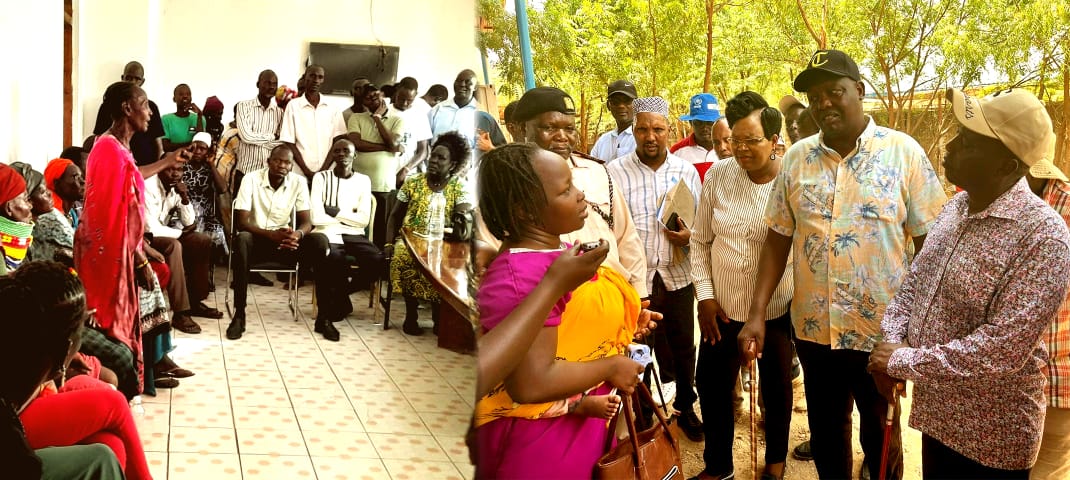𝐇𝐎𝐒𝐓 𝐂𝐎𝐌𝐌𝐔𝐍𝐈𝐓𝐈𝐄𝐒 𝐁𝐔𝐑𝐃𝐄𝐍𝐄𝐃 𝐁𝐘 𝐓𝐇𝐄 𝐈𝐍𝐅𝐋𝐔𝐗 𝐎𝐅 𝐑𝐄𝐅𝐔𝐆𝐄𝐄𝐒 𝐈𝐍 𝐓𝐇𝐄 𝐂𝐎𝐔𝐍𝐓𝐑𝐘, 𝐇𝐎𝐔𝐒𝐄 𝐂𝐎𝐌𝐌𝐈𝐓𝐓𝐄𝐄 𝐄𝐒𝐓𝐀𝐁𝐋𝐈𝐒𝐇𝐄𝐒
Refugee Host Communities of Kakuma (Turkana Cunty) and Dadaab (Garissa County) Refugee Camps have decried ‘unfair’ treatment due to scarcity of resources.
Regional Development Committee has heard that host communities for refugees living in the country are deprived off basic needs.
among the grievances raised by local residents were complaints of limited access to essential services such as clean water, healthcare, and education, which they said were provided primarily for the refugees.
The Committee Chaired by Hon. Peter Lochakapong (Sigor), conducted a fact-finding mission to Kakuma and Kalobeyei refugee camps in Lodwar, Turkana County and Dadaab and Fafi constituencies in Garissa County where the camps visited included IFO 1, IFO 2, Kabiyos, Dagahaley, and Hagadera.
“As a Committee, we oversight refugee affairs and we have visited today the Kakuma Refugee Camp just to find out the issues raised by residents and how the refugees are integrated within the community”, noted Hon. Lochakapong.
During the visit, the Committee discovered growing tensions between refugees and the host communities, a situation that Members said could potentially become a volatile issue.
While visiting the Garissa county-based Camps, Committee Members were shocked to learn that many refugees from neighboring Somalia view Kenya’s Dadaab refugee camps as a "land of milk and honey."
Locals informed the Committee that Refugees were lured by stories of better opportunities from relatives already registered in the camps, the Committee established that many refugees make their way to Dadaab, often bribing security personnel at the porous Kenya-Somalia border to gain entry.
The Committee also noted that security challenges at the porous Kenya-Somalia border are a key factor driving the ongoing influx of refugees into Kenya.
Speaking to the press after completing their visit on Thursday, Chairman Hon. Lochakapong explained that the trip was part of a Fact-Finding Mission aimed at addressing pressing issues affecting both refugees and the local host communities.
During the tour of duty, Members further established that residents of both regions experienced severe environmental degradation, minimal support from UNHCR, limited government presence, and increased competition for resources like pasture due to the large refugee population.
Statistics indicate that currently, Dadaab hosts approximately over 408,000 refugees, while the local population stands slightly over 319,000, a number pointing out to a large number of refugees more than that of the host Community.
In both sites, the Committee met and engaged with several key stakeholders, including World Vision, UNHCR, the World Food Program (WFP), and the International Organization for Migration (IOM) which reported significant challenges due to reduced donor funding, which has severely impacted their operations in the region.
"In general, we observed that the attention given to refugees is disproportionately affecting the host communities," Hon. Lochakapong said.
" For example, in Dadaab Camps, the host community has not benefited from the resources provided by donors. For example, there are about 3,000 scholarships for refugees, while only about 30 are available for local community members, which is clearly unfair," Hon. Lochakapong.
The Committee emphasized the need for the Kenyan government to increase its financial commitment to Refugee Camps, ensuring a more visible and effective government presence in the area.
The local population is seeking a formal agreement or official policy that clarifies their role in hosting refugees and ensures that their own needs are not overlooked.
Hon. Mary Wamaua (Maragua) and Vice-Chairperson of the Committee, announced that a stakeholders' meeting would take place in Mombasa on Friday.
"Representatives from various Agencies and Ministries will gather to discuss the Committee's findings from both Kakuma and Dadaab Camps, with the goal of identifying solutions to the challenges facing both refugees and host communities," she said.
Hon. Salah Farah Yakub, the area MP (Fafi constituency) echoed calls for action from UNHCR, urging the Agency to implement policies that reduce the pressure on local communities.
While Hon. Farah emphasized that the host communities are not opposed to refugee integration, he insisted that clear agreements be made to ensure fairness in resource distribution.
MPs Peter Nabulindo (Matungu) and Salah Yakub (Fafi) expressed frustration over what they described as the government’s favoritism towards refugees.
Hon. Joesph Cherorot (Kipkelion East) encouraged local communities to safeguard their environment and adhere to the Presidential directive to grow 15 Million Trees by 2030, a move he said will help restore water catchment resources and provide a conducive environment for human settlement.
Ganze MP, Hon. Kenneth Tungule Kazungu, affirmed the Committee’s commitment to ensuring harmony between the refugee and host communities.
“As a committee, we are here to witness firsthand the challenges faced by the people of Garissa, and we are committed to ensuring that they live in harmony with the refugee community. We also believe that all Kenyans should share national resources equitably,” said Hon. Kazungu.
While Hon. Farah emphasized that the host communities are not opposed to refugee integration, he insisted that clear agreements be made to ensure fairness in resource distribution.
"We have always welcomed refugees, offering land, water, and hospitality. However, one critical aspect has been overlooked: the formal signing of a memorandum of understanding (MOU) between UNHCR and the government of Kenya," Hon. Farah said. "This time, we insist on signing such an MOU so that we can clearly understand our role in the integration process and how resources will be shared. Without this agreement, we will oppose further integration”, Hon. Farah added.
The Committee’s findings and recommendations will be shared in upcoming discussions, as they work to balance the needs of both refugees and host communities in both Kakuma and Dadaab Refugee Camps.
















